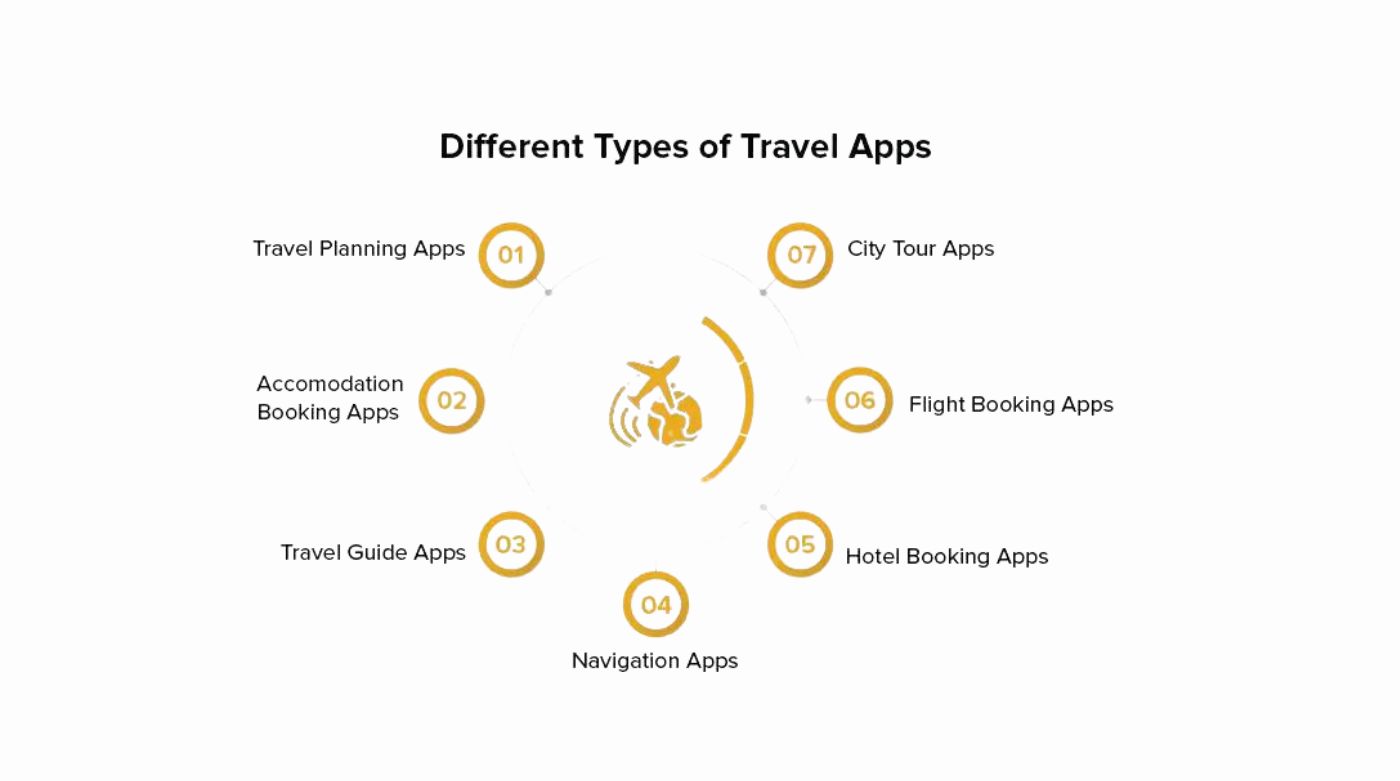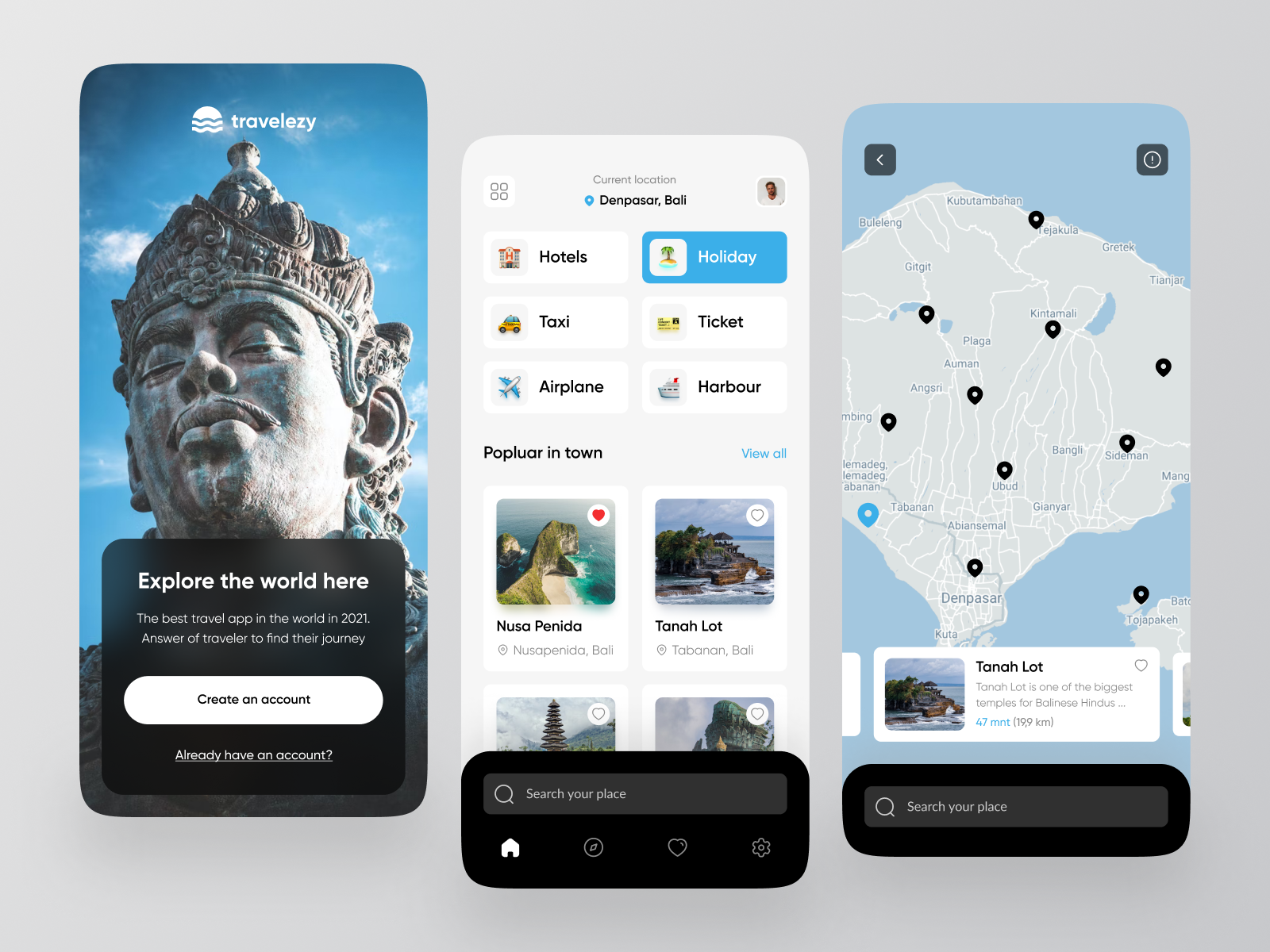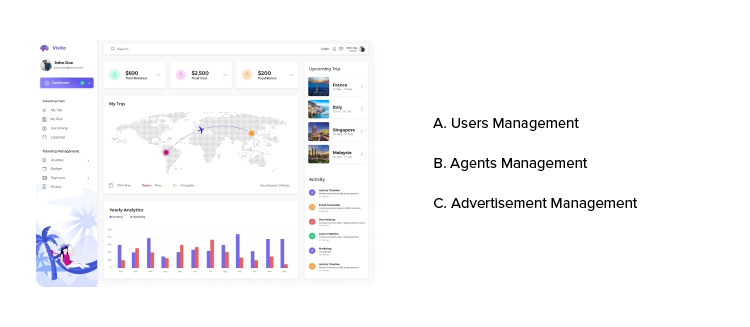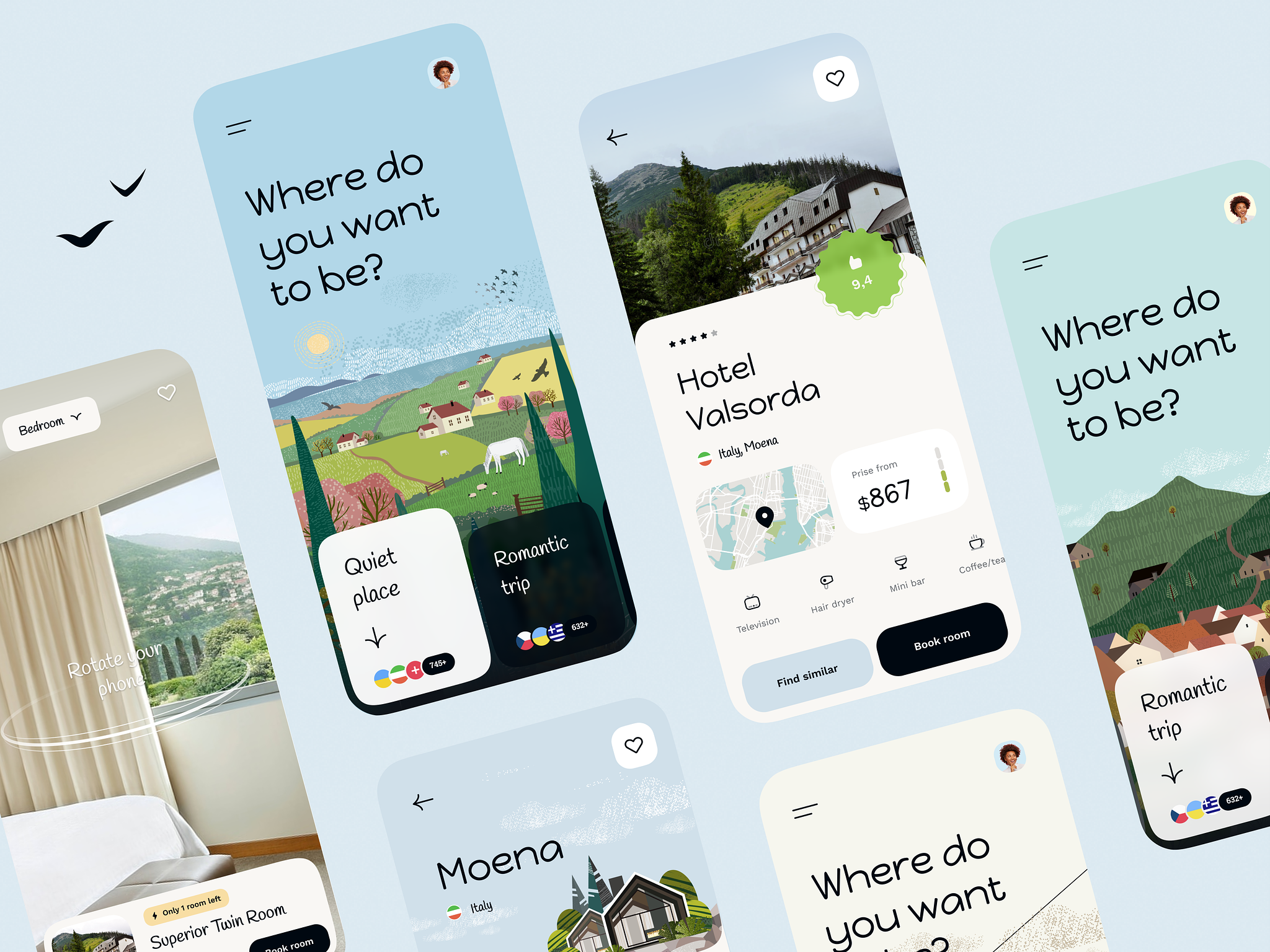In recent years, the travel industry has witnessed a remarkable transformation with the rise of travel guide apps. These digital companions have revolutionized how people plan, book, and experience their journeys, offering convenience and personalization at travelers’ fingertips. As more individuals seek seamless travel experiences, the demand for innovative travel apps continues to grow, presenting exciting opportunities for travel app development companies to create solutions that cater to diverse traveler needs.
The world of travel app development is vast and ever-evolving, encompassing various types of applications designed to address specific aspects of the travel experience. From comprehensive trip planners and booking platforms to specialized tools for navigation and local recommendations, the possibilities are endless. This article delves into the essential features that make a travel app successful, explores monetization strategies, discusses the challenges faced in development, and examines future trends shaping the industry. Additionally, it highlights the importance of user-centered UI/UX design in creating engaging and intuitive travel applications.

The Rise of Travel Apps in the Tourism Industry
The travel industry has witnessed a significant transformation with the advent of mobile applications. These digital tools have revolutionized how people plan, book, and experience their journeys, offering convenience and personalization at travelers’ fingertips. The rise of travel apps has had a profound impact on the tourism sector, reshaping traditional booking methods and enhancing the overall travel experience.
Market Statistics
The travel app market has experienced substantial growth in recent years. In 2023, the industry generated an impressive $629 billion in revenue, marking a 13% increase from the previous year. This growth is particularly evident in key markets such as the United States and China. The United States leads the pack with a revenue of $538.1 million in the travel segment of the app market, followed closely by China with $382.7 million.
Booking Holdings and Expedia Group have emerged as the dominant players in the online travel booking industry, accounting for approximately 60% of all travel bookings in Europe and the United States. Airbnb has also carved out a significant niche, securing the third spot with its seven million short-term rentals.
User Adoption Trends
The adoption of travel apps has been widespread, with over 850 million people using a travel app in 2023 1. This surge in usage can be attributed to the increasing smartphone penetration and the growing acceptance of mobile reservations. Users have embraced these apps for their ability to facilitate various aspects of travel planning and booking.
Travel apps have become essential tools for users to search, compare, and book trips and accommodations efficiently. Approximately 48% of US customers prefer to research, plan, and book an entire trip using mobile apps . This trend highlights the importance of travel mobile app development for companies aiming to reach customers instantly and provide personalized services.
Impact on Traditional Travel Booking
The rise of travel apps has significantly disrupted traditional travel booking methods. These digital platforms have challenged the conventional hotel sector by offering alternative accommodation options. Apps like Airbnb and HomeAway have connected travelers seeking unique lodging experiences with homeowners, providing more specialized and often more economical solutions .
Moreover, travel apps have reduced the reliance on traditional travel agents. Users can now easily access real-time information on fares, availability of hotel rooms, and flight tickets through API/GDS integrations . This has streamlined the booking process, making it more efficient and transparent for travelers.
The impact of travel apps extends beyond just bookings. These applications have become comprehensive tools for the entire travel experience, offering features such as trip planning, destination recommendations, offline maps, and travel guides . Apps like TripIt, Google Trips, and Tripadvisor have enhanced the way travelers explore and interact with their destinations.
In conclusion, the rise of travel apps in the tourism industry has brought about a paradigm shift in how people approach travel. From market statistics showing significant revenue growth to widespread user adoption and the transformation of traditional booking methods, these digital tools have become indispensable in the modern travel landscape.

Essential Features for a Successful Travel App
User-friendly Interface
A successful travel app should prioritize a user-friendly interface that allows travelers to navigate and access features effortlessly. The interface should enable users to explore destinations, book accommodations, and plan itineraries with just a few taps on their smartphones . Intuitive design contributes to an overall positive experience, making it easier for users to find the information they need quickly.
Personalized Recommendations
Personalization has become increasingly important in the travel industry. In 2023, 65% of customers expected personalized experiences, up from 52% in 2021 2. To meet this demand, travel apps should incorporate artificial intelligence (AI) and machine learning (ML) to analyze customers’ behavioral patterns and provide tailored recommendations.
AI-powered personalization in travel apps offers several benefits:
- Enhanced customer experiences
- Improved customer loyalty
- Increased repeat business
- Positive word-of-mouth
For example, apps like TravelWiz and TravelPal use AI to create personalized itineraries based on users’ preferences, interests, and destinations. These AI-powered tools revolutionize vacation planning by offering customized attractions and activities with minimal effort from the user.
Real-time Updates
One of the significant advantages of travel apps is the provision of real-time updates. Users can receive information about flight delays, weather conditions, or traffic, enabling them to make informed decisions and adjust their plans accordingly . This feature ensures a smoother travel experience and helps travelers stay informed throughout their journey.
For instance, some airlines use handheld devices to provide flight attendants with real-time information about travelers, such as whether they are frequent flyers or may have had a flight canceled. This allows them to tailor the in-flight experience accordingly. Additionally, flight attendants can identify passengers with short connections and assist them in deplaning quickly to make their next flight.
Social Integration
Travel apps with social integration features enable users to share their travel experiences, photos, and recommendations with their social networks . This not only fosters a sense of community but also serves as a valuable source of information for friends and followers.
Social sharing and community building are important components of modern comprehensive mobile travel apps. They allow the audience to exchange thoughts about certain places, find support in difficult situations, and facilitate networking . For example, when a guest posted an image of a new engagement ring and geotagged the hotel they were staying in, the hotel delivered a bottle of champagne to her room. The guest then posted another image with the hotel-branded champagne and glasses, including hashtags that helped provide positive publicity for the brand.
By incorporating these essential features, travel app developers can create comprehensive tools that cater to the diverse needs of modern travelers, enhancing their overall travel experience and fostering customer loyalty.

Monetization Strategies for Travel Apps
Travel apps have various strategies to generate revenue and sustain their operations. Here are some of the most effective monetization methods:
Commission-based Model
Many travel apps utilize a commission-based model to generate income. This approach involves charging a small fee to service providers listed on the app, such as accommodation hosts, hotels, or tour operators 1. The commission is typically a percentage of the booking value and is only paid when a customer makes a reservation through the app. This model offers several advantages:
- It provides an incentive for service providers to join the platform.
- It ensures a steady flow of customers without additional advertising costs.
- As the user base grows, the number of bookings and transactions increases, leading to a consistent stream of commission fees.
For example, popular platforms like Airbnb and Booking.com employ this strategy effectively, taking a cut from each reservation made through their apps.
Advertising
In-app advertising is another common monetization strategy for travel apps. While ads can sometimes be perceived as annoying, they can be an effective way to generate income when implemented strategically 2. There are several forms of in-app advertising, including:
- Native ads
- Text ads
- Video ads
- Banner ads
- Full-screen ads that appear between activities or pauses
To enhance user experience, it’s crucial to ensure that the ads are relevant to the app’s topic and provide value to users. For instance, a flight booking app could feature ads for car rental services or travel gear stores, offering users additional information and resources related to their travel needs 2.
Freemium Model
The freemium model, also known as the premium model, is a popular approach for travel app monetization. This strategy involves offering a basic version of the app for free while providing advanced features through a paid subscription . The freemium model can be implemented in two ways:
- Offering a free basic version with limited functionality and a paid premium version with additional features.
- Providing a free trial period for all features, after which users must subscribe to continue using the app.
This model appeals to users who want more personalized and comprehensive travel planning tools without overwhelming them with upfront costs. For example, apps like TripIt offer a free basic version for itinerary management, while the premium version includes features such as real-time flight updates and seat tracking .
Subscription Plans
Subscription-based models have gained popularity in recent years, with 98% of respondents in a 2021 survey reporting having at least one paid video streaming subscription. Travel apps can leverage this trend by offering subscription plans that provide exclusive benefits and services to users. These plans can include:
- Access to discounted deals and cashback offers
- Complimentary services such as priority check-in or extra baggage allowance
- Exclusive content like detailed travel guides or virtual tours
For instance, TripAdvisor Plus offers subscribers access to discounted bookings on hotels and experiences, along with additional perks like upgrades and complimentary meals, for an annual fee of $99 4. Similarly, Alaska Airlines’ Flight Pass charges $49 per month at the entry level, entitling subscribers to six round-trip flights a year at discounted rates.
By implementing these monetization strategies, travel app developers can create sustainable revenue streams while providing value to their users. The key is to strike a balance between generating income and maintaining a positive user experience.
Challenges in Travel App Development
Data Security and Privacy
In the digital age, ensuring data security and privacy has become a critical challenge for travel app developers. As travel management increasingly relies on digital platforms, the vulnerability of sensitive information to cyber threats becomes more pronounced. The travel industry has experienced a significant increase in data breaches, with a 50% rise in 2019 compared to the previous year. This surge in cyber attacks has resulted in millions of dollars in losses for travel companies and exposed the personal information of countless travelers.
Travel apps often require users to input sensitive data such as credit card details, passport numbers, and travel itineraries. Protecting this information is crucial to prevent identity theft, financial loss, and reputational damage. To address these concerns, travel app developers must implement robust encryption methods. Data encryption converts plain text or data into a coded version that can only be accessed by authorized parties with the corresponding decryption key.
Integration with Multiple Service Providers
Another significant challenge in travel app development is the integration of multiple service providers. Despite the abundance of travel apps available, users often need to interface with two or more platforms to cover all aspects of their journey . While travel aggregators like Booking.com might offer flights, hotels, and car rentals, travelers still require additional apps for navigation, dining, banking, and other necessities.
To overcome this challenge, developers are exploring the concept of an all-in-one travel app, also known as a “super app” . This approach aims to create a comprehensive platform that covers everything travelers need, from finding inexpensive flights and accommodations to making dining reservations, generating optimal travel routes, and even handling incidental charges like visa and tourism fees.
Scalability
As travel apps gain popularity, scalability becomes a crucial concern. Application scalability allows a solution to grow alongside the business and handle many users simultaneously . The main priority of scaling is managing behind-the-scenes components like databases and servers to maintain top-notch application performance.
Cloud-based solutions offer flexible resources that allow businesses to adjust computing needs quickly. This advantage is particularly useful for businesses with changing workloads, rapid growth, or global operations . Cloud providers offer pre-built scaling solutions, reducing the need for manual configuration and technical expertise. Moreover, businesses that transition to cloud-based solutions often experience a substantial 84% reduction in costs, thanks to the pay-as-you-go model .
User Retention
User retention presents a significant challenge for travel app developers. According to Statista, the average 90-day retention rate for hospitality and travel apps is only 44%. This low retention rate is partly due to the irregular nature of travel, with people typically traveling only about twice a year. This substantial time gap between trips provides ample opportunity for users to forget about their previous travel experience and potentially switch to competing apps.
To address this challenge, travel app developers must focus on creating engaging experiences that encourage users to return to the app even when they’re not actively planning a trip. Some effective strategies include:
- Optimizing the app onboarding experience to show users the app’s real value early on.
- Incorporating destination storytelling and bite-sized content to give users reasons to open the app beyond booking trips.
- Implementing loyalty programs to reward repeat customers and encourage direct bookings.
- Offering flexible booking options to accommodate changing plans, especially relevant in the post-pandemic era.
By addressing these challenges, travel app developers can create more comprehensive, secure, and engaging platforms that better serve the needs of modern travelers.
Future Trends in Travel App Development
AI and Machine Learning Integration
The integration of AI and machine learning in travel apps is set to revolutionize the way people plan and experience their journeys. These technologies have the potential to analyze vast amounts of data to provide personalized recommendations and enhance user experiences. AI-powered chatbots are becoming increasingly sophisticated, offering real-time assistance to travelers and helping them make informed decisions about their trips.
Machine learning algorithms can predict travel trends, optimize pricing strategies, and improve the accuracy of travel forecasts. This allows travel companies to offer more competitive rates and better services to their customers. Additionally, AI can analyze user behavior and preferences to create highly tailored itineraries, ensuring that each traveler receives recommendations that align with their unique interests and needs.
Augmented Reality Features
Augmented reality (AR) is poised to transform the travel experience by overlaying digital information onto the real world. Travel apps are incorporating AR features to provide interactive city guides, real-time translation of signs and menus, and virtual tours of destinations before booking. This technology enables travelers to explore potential accommodations or attractions in a more immersive way, helping them make more informed decisions.
AR can also enhance the on-site experience by providing historical context to landmarks, offering virtual reconstructions of ancient ruins, or guiding travelers through complex transportation hubs. As AR technology continues to advance, it has the potential to make travel more engaging, educational, and accessible for users of all backgrounds.
Blockchain for Secure Transactions
Blockchain technology is gaining traction in the travel industry due to its potential to enhance security and transparency in transactions. Travel apps are exploring blockchain solutions to streamline processes such as identity verification, loyalty programs, and payment systems. By utilizing blockchain, these apps can offer more secure and efficient ways for users to book and pay for their travel arrangements.
The decentralized nature of blockchain can help reduce fraud and improve trust between travelers and service providers. Smart contracts enabled by blockchain technology can automate many aspects of the booking process, potentially reducing costs and increasing efficiency for both travelers and travel companies.
Voice-activated Assistants
Voice-activated assistants are becoming increasingly prevalent in travel apps, offering hands-free convenience for users on the go. These AI-powered assistants can help travelers with tasks such as booking flights, finding nearby restaurants, or providing real-time travel updates. As natural language processing technology improves, voice assistants are becoming more adept at understanding context and providing more nuanced and helpful responses.
The integration of voice-activated features in travel apps can significantly enhance accessibility for users with visual impairments or those who prefer hands-free interaction. This technology also has the potential to make travel planning and on-the-go assistance more intuitive and user-friendly for all travelers.
As these trends continue to evolve, travel app developers are focusing on creating more seamless, personalized, and secure experiences for users. The integration of AI, AR, blockchain, and voice-activated assistants represents a significant shift towards more intelligent and responsive travel applications that can adapt to the unique needs of each traveler.
Conclusion
Travel apps have emerged as essential tools in the modern traveler’s arsenal, reshaping the way people plan, book, and experience their journeys. These digital companions offer a range of features, from personalized recommendations to real-time updates, making travel more convenient and enjoyable. As the industry continues to evolve, developers face challenges such as data security, service integration, and user retention, but also exciting opportunities in AI, augmented reality, and blockchain technology.
Looking ahead, the future of travel app development holds promise for even more seamless and personalized experiences. The integration of AI and machine learning has the potential to revolutionize trip planning, while augmented reality features could transform how travelers interact with their destinations. As these technologies continue to advance, travel apps are set to become increasingly intelligent, responsive, and tailored to each user’s unique needs, ultimately enhancing the overall travel experience.
FAQs
1. What is the typical cost range for developing a travel app?
Developing a travel app can vary in cost from $25,000 to $50,000, with an average price around $37,500. The cost largely depends on the complexity and number of features; a basic app with minimal features (minimum viable product, or MVP) will generally be less expensive than a fully featured app.
2. What are the steps involved in developing a travel app?
To develop a travel app, follow these five key steps:
- Decide on the type of travel app you want to develop, such as booking, accommodation booking, transport apps, or travel guides.
- Conduct research on competitors to understand the market.
- Choose the features for your travel app MVP.
- Hire a team of developers specialized in travel apps.
- Begin the discovery phase to refine your app concept and then proceed to the actual development of the app.
3. How much revenue does the travel app industry generate annually?
In 2023, the travel app industry reached a market size of $629 billion, marking a 13% growth from the previous year.
4. What is the development timeline for a travel app?
The time required to develop a travel app can range from 3 to 12 months or more, depending on the app’s complexity. A basic app with essential features like flight and hotel booking might take between 3 to 6 months, whereas an app with advanced functionalities such as AI-powered recommendations, itinerary sharing, or multilingual support could take 6 to 12 months or longer to develop.



